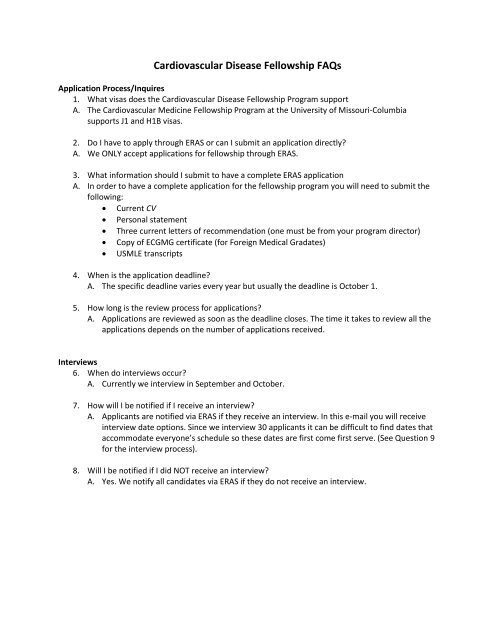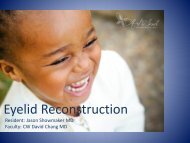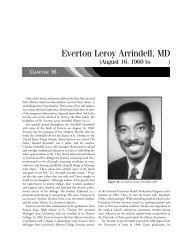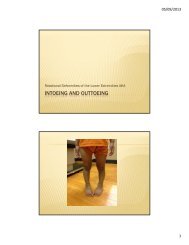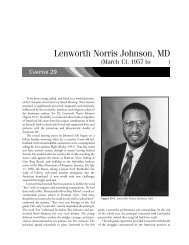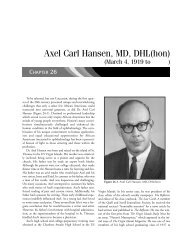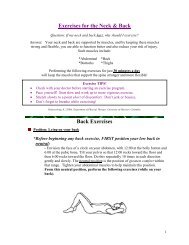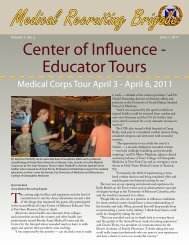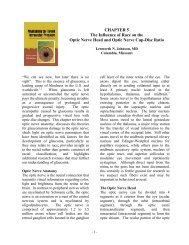Cardiovascular Medicine Fellowship FAQs - University of Missouri
Cardiovascular Medicine Fellowship FAQs - University of Missouri
Cardiovascular Medicine Fellowship FAQs - University of Missouri
Create successful ePaper yourself
Turn your PDF publications into a flip-book with our unique Google optimized e-Paper software.
<strong>Cardiovascular</strong> Disease <strong>Fellowship</strong> <strong>FAQs</strong><br />
Application Process/Inquires<br />
1. What visas does the <strong>Cardiovascular</strong> Disease <strong>Fellowship</strong> Program support<br />
A. The <strong>Cardiovascular</strong> <strong>Medicine</strong> <strong>Fellowship</strong> Program at the <strong>University</strong> <strong>of</strong> <strong>Missouri</strong>-Columbia<br />
supports J1 and H1B visas.<br />
2. Do I have to apply through ERAS or can I submit an application directly?<br />
A. We ONLY accept applications for fellowship through ERAS.<br />
3. What information should I submit to have a complete ERAS application<br />
A. In order to have a complete application for the fellowship program you will need to submit the<br />
following:<br />
� Current CV<br />
� Personal statement<br />
� Three current letters <strong>of</strong> recommendation (one must be from your program director)<br />
� Copy <strong>of</strong> ECGMG certificate (for Foreign Medical Gradates)<br />
� USMLE transcripts<br />
4. When is the application deadline?<br />
A. The specific deadline varies every year but usually the deadline is October 1.<br />
5. How long is the review process for applications?<br />
A. Applications are reviewed as soon as the deadline closes. The time it takes to review all the<br />
applications depends on the number <strong>of</strong> applications received.<br />
Interviews<br />
6. When do interviews occur?<br />
A. Currently we interview in September and October.<br />
7. How will I be notified if I receive an interview?<br />
A. Applicants are notified via ERAS if they receive an interview. In this e-mail you will receive<br />
interview date options. Since we interview 30 applicants it can be difficult to find dates that<br />
accommodate everyone’s schedule so these dates are first come first serve. (See Question 9<br />
for the interview process).<br />
8. Will I be notified if I did NOT receive an interview?<br />
A. Yes. We notify all candidates via ERAS if they do not receive an interview.
9. What is the interview process?<br />
A. If you are selected for an interview you’ll receive an e-mail via ERAS with 3 or 4 interview<br />
dates. Typically, we pick dates on a Monday or Friday to help with travel and call issues you<br />
may have. These dates are first come, first serve. Once you have selected a date and emailed<br />
it back to the coordinator you’ll receive a confirmation that your date has been<br />
secured.<br />
The night before there is a social event for candidate to meet faculty and fellows and discuss<br />
the program. The day <strong>of</strong> the interview, candidates attend a morning conference and then<br />
are split into two groups. One group will go on a tour <strong>of</strong> the hospital while the other group<br />
interviews with faculty and chief fellows.<br />
Candidates interview with each faculty/chief fellow for 15-20 minutes until they have met<br />
with all interviewers. Mid-morning the groups switch. Those who interviewed first now go<br />
on a tour <strong>of</strong> the hospital and the other group interviews. Once all interviews are finished,<br />
candidates enjoy a lunch with the current fellows to discuss the fellowship program. After<br />
lunch, candidates are free to leave.<br />
10. How long is the interview day?<br />
A. We recommend all applicants arrive at the hospital at 7:00 AM. Candidates meet the<br />
coordinator in the front lobby. The coordinator will escort the candidates to the academic<br />
<strong>of</strong>fice and will register the candidates. Morning conference begins at 7:30 AM. The interview<br />
day typically ends at 2 pm. This end time may vary depending on the number <strong>of</strong> candidates.<br />
11. How will I get to the hospital the day <strong>of</strong> the interview?<br />
A. You may always drive yourself or take a cab to the hospital the day <strong>of</strong> the interview. If you<br />
stay at the Courtyard Marriott Hotel (See Question 18 for more information about hotels)<br />
there will be a shuttle service that will take you to the hospital and back to the hotel after<br />
the interviews. You’ll want to check with the front desk for the time as the coordinator<br />
arranges the departure time and arrival time for the hotel shuttle to the hospital.<br />
12. How many fellows does the program take each year?<br />
A. Currently, we take three clinical and one research fellow per year. There are a total <strong>of</strong> 12<br />
fellows; 4 in each year.<br />
13. After the interviews how do I know if I was selected for the fellowship program?<br />
A. The <strong>University</strong> <strong>of</strong> <strong>Missouri</strong>-Columbia <strong>Cardiovascular</strong> <strong>Medicine</strong> <strong>Fellowship</strong> Program<br />
participates in the National Resident Matching Program (NRMP). In order to be selected<br />
candidates MUST register with the NRMP: http://www.nrmp.org/<br />
We follow the guidelines and rules <strong>of</strong> the NRMP. We submit our match list by the<br />
designated deadline. The match list typically appears mid-December.
14. What happens after I am selected for the fellowship program?<br />
A. If you match with us, you’ll receive a letter from the Program Director. This letter is a<br />
written agreement that you are accepting the position. NOTE: This is not an <strong>of</strong>ficial contract<br />
but is an <strong>of</strong>fer letter so both parties have something in writing. Around February <strong>of</strong> the year<br />
you start your fellowship, you’ll receive an e-mail and packet from the HR credentialing<br />
coordinator. It is very important that you fill out the contents <strong>of</strong> the packet and return the<br />
information back to HR as quickly as possible to prevent delay in your fellowship start date.<br />
It is also important to keep the fellowship coordinator updated on any address or e-mail<br />
changes you make before starting your fellowship at the <strong>University</strong> <strong>of</strong> <strong>Missouri</strong>-Columbia.<br />
You must obtain a Permanent Medical license or Training License in <strong>Missouri</strong> prior to<br />
starting your fellowship.<br />
Travel and Hotel Accommodations<br />
15. How do I get to Columbia, <strong>Missouri</strong>?<br />
A. There are many options when it comes to traveling to Columbia, <strong>Missouri</strong>.<br />
First, you can drive to Columbia. Columbia, <strong>Missouri</strong> is in the middle <strong>of</strong> Kansas City, <strong>Missouri</strong><br />
and St. Louis, <strong>Missouri</strong> on I-70.<br />
Secondly, Columbia, <strong>Missouri</strong> does have a regional airport only 15 minutes from Columbia<br />
with flights to and from Atlanta and Memphis. You can fly into the airport and take a cab or<br />
hotel shuttle (depending on the hotel) to reach the hotel.<br />
Lastly, you can choose to fly into Kansas City International Airport (MCI) or Lambert - St.<br />
Louis International Airport (STL). Both airports are approximately a 1 hour and 45 minute to<br />
2 hour drive to Columbia. You can rent a car, take a cab, or use Mo-X (a shuttle service) (See<br />
Question 16 for more information on Mo-X) to get to Columbia.<br />
16. What is Mo-X and how to I book them?<br />
A. Mo-X is a schedule ground transportation service between Columbia and Kansas City and St.<br />
Louis Airports. There website is: https://www.moexpress.com/tac/default.aspx<br />
Phone Number for Mo-X is 573-256-1991 or toll free 877-669-4826. To book a shuttle you<br />
can either call them or reserve a shuttle on-line. This must be done at least 24-hours in<br />
advance. Pricing and a schedule <strong>of</strong> times can be found on-line. You must be ready by the<br />
time stated as they run on a tight schedule.<br />
17. What if I want to take a cab or taxi?<br />
A. There are many taxi and/or cab services in Columbia. Here are a couple<br />
Terry’s Taxi-573-441-1414<br />
Tiger Taxi - 573-474-3222
18. What hotels are available in Columbia?<br />
A. Columbia has many hotels available to stay at. If you choose to stay at the Courtyard<br />
Marriott they have discounted deals for applicants through the <strong>University</strong> <strong>of</strong> <strong>Missouri</strong>-<br />
Columbia. You must notify the coordinator if you are going to stay at the Courtyard so the<br />
coordinator can notify the hotel and provide you with the code for the discount. Below is a<br />
short list <strong>of</strong> the hotels available with contact information. Additionally, the Courtyard does<br />
have a shuttle service to Columbia Regional Airport and to the hospital.<br />
Courtyard Marriott – 573-443-8000<br />
http://www.marriott.com/hotels/fact-sheet/travel/COUCY<br />
Hampton Inn and Suites Columbia (at the <strong>University</strong> <strong>of</strong> <strong>Missouri</strong>) – 573-214-1222<br />
http://hamptoninn.hilton.com/en/hp/hotels/index.jhtml?ctyhocn=COUUMHX<br />
Stoney Creek Inn – 800-659-2220<br />
http://www.stoneycreekinn.com/hotel/travel/columbia/home.do<br />
19. What is a research fellow?<br />
A. There are two tracks in the <strong>Cardiovascular</strong> Disease <strong>Fellowship</strong> Program. First is a clinical<br />
track, which most fellows are on. This is a three year program in which the fellow completes<br />
all required rotations, performs clinical duties, and takes evening and weekend calls. The<br />
second track is a research track, which typically only one fellow each year is selected for.<br />
This fellows work with a selected faculty member who mentors the fellow through their<br />
research. The fellows first year (first 12 months <strong>of</strong> fellowship) is spent on research blocks.<br />
They are still required to conduct clinic and take call in the first year <strong>of</strong> fellowship. The<br />
research fellow begins their clinical rotations in their second year <strong>of</strong> fellowship.<br />
20. What certifications/boards will I be prepared for when I finish my fellowship?<br />
A. A fellow on the clinical track will be able to use elective rotations to complete the following<br />
requirements for certification/boards in the following areas: General Cardiology boards,<br />
Level II Echocardiography and Nuclear Boards.<br />
A fellow on the research track will have a limited number <strong>of</strong> electives since their first year is<br />
dedicated to research and they must still meet the general cardiology requirements.<br />
Therefore, research fellows will have to make a decision early on as to which<br />
certification/boards are most important to you.<br />
21. Does the <strong>University</strong> <strong>of</strong> <strong>Missouri</strong>-Columbia have other sub-specialty <strong>Cardiovascular</strong> Disease<br />
fellowships such as Interventional or Electrophysiology fellowships?<br />
A. At this time the <strong>University</strong> <strong>of</strong> <strong>Missouri</strong>-Columbia only has a General <strong>Cardiovascular</strong> Disease<br />
<strong>Fellowship</strong>.<br />
22. Is the <strong>Cardiovascular</strong> Disease <strong>Fellowship</strong> Program at the <strong>University</strong> <strong>of</strong> <strong>Missouri</strong> accredited?<br />
A. Yes, our <strong>Cardiovascular</strong> <strong>Medicine</strong> <strong>Fellowship</strong> Program is accredited through the<br />
Accreditation Council for Graduate Medical Education (ACGME)<br />
http://www.acgme.org/acWebsite/newsRoom/newsRm_acGlance.asp<br />
The ACGME reviews the program at the end <strong>of</strong> the term to ensure we are in compliance<br />
with program requirements set forth by the accrediting body. The ACGME and review<br />
committees are committed to improving the quality <strong>of</strong> resident/fellow education in the<br />
United States
23. What is accreditation?<br />
A. Accreditation ensures a basic level <strong>of</strong> quality in the education you receive from an<br />
institution and ensures your degree will be recognized.<br />
24. How does accreditation affect me?<br />
A. Accreditation is the tool used to monitor, assess, and evaluate the standards and quality <strong>of</strong><br />
education you receive. Additionally, many hospitals in the United States and Canada will<br />
NOT accept someone who did NOT attend an accredited medical institution.<br />
25. What educational experiences can I expect?<br />
A. See “Conferences” under <strong>Fellowship</strong> Links<br />
26. What are the program requirements?<br />
A. Nine months <strong>of</strong> non-laboratory clinical practice (ie: consultations, cardiac care units,<br />
postoperative care <strong>of</strong> cardiac surgery patients, congenital heart disease, heart<br />
failure/cardiac transplantation, preventative cardiology, and vascular medicine)<br />
Twenty-four months <strong>of</strong> clinical training, including inpatient sand special experiences in<br />
which a minimum <strong>of</strong> twelve months must be spent in the following areas: Four months <strong>of</strong><br />
cardiac catheterization laboratory; Six months <strong>of</strong> noninvasive cardiac evaluations broken<br />
down in the following manner: three months <strong>of</strong> echocardiography and Doppler, two months<br />
<strong>of</strong> nuclear cardiology, one month <strong>of</strong> noninvasive cardiac evaluation (including: exercise<br />
stress testing, ECG interpretation, ambulatory ECG monitoring, and MRI)<br />
Clinic consists <strong>of</strong> a half day every week which alternate between the <strong>University</strong> Hospital and<br />
the VA Hospital (located across the street).<br />
27. What electives can I take?<br />
A. You can choose to do electives in Adult Congenital Heart Disease and, Advanced Heart<br />
Failure. In additional, you can use your elective time to do more Cardiac Catheterization,<br />
Echocardiography, or Nuclear Cardiology (after you’ve completed your required number <strong>of</strong><br />
months) in order to reach the requirements for certification/boards.<br />
28. Can I complete an elective at another institution?<br />
A. Yes, we allow fellows to do away rotations with approval <strong>of</strong> the Program Director. While we<br />
have didactics in many areas we don’t necessarily have the patient volume to support<br />
certain rotations such as adult congenital heart disease and advanced heart failure. These<br />
elective rotations are taken at Washington <strong>University</strong> in St. Louis.<br />
29. How am I evaluated?<br />
A. Fellows are evaluated on the ABIM Core Competencies after each rotation. They are also<br />
evaluated on their clinic progress by the clinical faculty member quarterly.<br />
30. What is the call schedule like?<br />
A. Each month the second year Chief Fellows puts together the call schedule and provides it to<br />
the coordinator. First year fellows take Consult and CICU call. Third years take Echo/Cath call<br />
and second years can take both calls. Fellows are placed on call in evenly distributed<br />
amounts (between all fellows) and cannot be placed on the schedule within three days <strong>of</strong><br />
each other. Additionally, fellows do not take call the night before they have a clinic. When
on call, the fellow has an Attending who is also on call and provides supervision and<br />
advisement.<br />
31. How many Cardiology faculty are there and what are their specialties?<br />
A . We have a total <strong>of</strong> 17 faculty members. Four Interventional faculty members, two<br />
Electrophysiology members, one MRI/Imaging specialist, nine non-invasive faculty members,<br />
and one full-time research faculty members.<br />
32. What is Columbia, <strong>Missouri</strong> like?<br />
A. See “Columbia” under <strong>Fellowship</strong> Links


